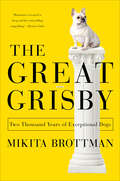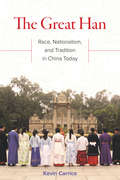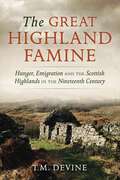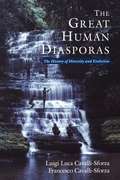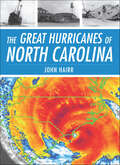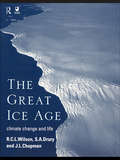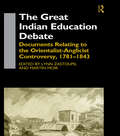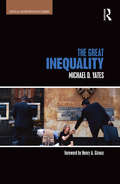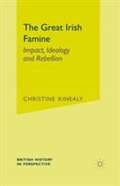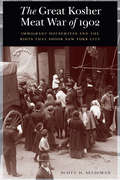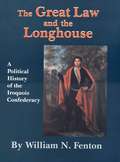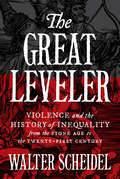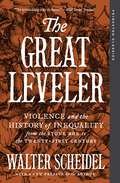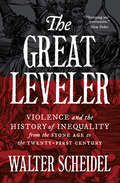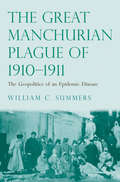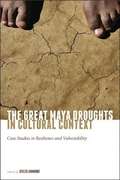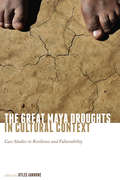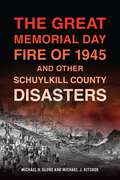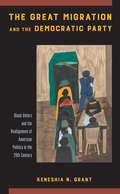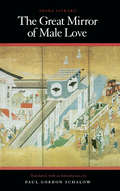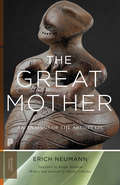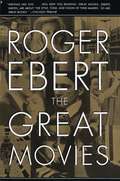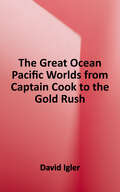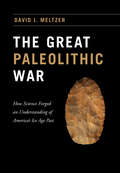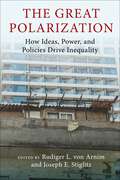- Table View
- List View
The Great Grisby: Two Thousand Years of Exceptional Dogs
by Mikita BrottmanA scholar, psychoanalyst, and cultural critic explores the multifaceted role dogs play in our world in this charming bestiary of dogs from literature, lore, and life.While gradually unveiling her eight-year love affair with her French bulldog, Grisby, Mikita Brottman ruminates on the singular bond between dogs and humans. Why do prevailing attitudes warn us against loving our pet “too much”? Is her relationship with Grisby nourishing or dysfunctional, commonplace or unique? Challenging the assumption that there’s something repressed and neurotic about those deeply connected to a dog, she turns her keen eye on the many ways in which dog is the mirror of man.The Great Grisby is organized into twenty-six alphabetically arranged chapters, each devoted to a particular human-canine union drawn from history, art, philosophy, or literature. Here is Picasso’s dachshund Lump; Freud’s chow Yofi; Bill Sikes’s mutt Bull’s Eye in Oliver Twist; and Elizabeth Barrett Browning’s spaniel Flush, whose biography was penned by Virginia Woolf. There are royal dogs, like Prince Albert’s greyhound Eos, and dogs cherished by authors, like Thomas Hardy’s fox terrier, Wessex. Brottman’s own beloved Grisby serves as an envoy for sniffing out these remarkable companions.Quirky and delightful, and peppered with incisive personal reflections and black-and-white sketches portraying a different dog and its owner drawn by the enormously talented Davina “Psamophis” Falcão, The Great Grisby reveals how much dogs have to teach us about empathy, happiness, love—and what it means to be human.
The Great Han: Race, Nationalism, and Tradition in China Today
by Kevin CarricoThe Great Han is an ethnographic study of the Han Clothing Movement, a neotraditionalist and racial nationalist movement that has emerged in China since 2001. Participants come together both online and in person in cities across China to revitalize their utopian vision of the authentic “Great Han” and corresponding “real China” through pseudotraditional ethnic dress, reinvented Confucian ritual, and anti-foreign sentiment. Analyzing the movement’s ideas and practices, this book argues that the vision of a pure, perfectly ordered, ethnically homogeneous, and secure society is in fact a fantasy constructed in response to the challenging realities of the present. Yet this national imaginary is reproduced precisely through its own perpetual elusiveness. The Great Han is a pioneering analysis of Han identity, nationalism, and social movements in a rapidly changing China.
The Great Highland Famine: Hunger, Emigration and the Scottish Highlands in the Nineteenth Century
by Tom M. DevineThe Great Hunger in nineteenth-century Ireland was a major human tragedy of modern times. Almost a million perished and a further two million emigrated in the wake of potato blight and economic collapse. Acute famine also gripped the Scottish Highlands at the same time, causing misery, hardship and distress. The story of that lesser known human disaster is told in this prize-winning and internationally acclaimed book. The author describes the classic themes of highland and Scottish history, including the clearances, landlordism, crofting life, emigration and migration in a subtle and intricate reconstruction based on a wide range of sources. This book should appeal to all those with an interest in Scottish history, the emigration of Scottish people and the Highland Clearances.
The Great Human Diasporas: The History of Diversity and Evolution
by Luigi Luca Cavalli-Sforza Francesco Cavalli-SforzaLuigi Luca Cavalli-Sforza draws upon his lifelong work in archaeology, anthropology, genetics, molecular biology, and linguistics, to address the basic questions of human origins and diversity. Coauthored by his son, Francesco, the book answers age-old questions such as: Was there a mitochondrial Eve? Did the first humans originate in Africa or in several spots on the planet at about the same time? How did humans get onto North America, the tip of South America, and Australia?
The Great Hurricanes of North Carolina (Disaster)
by John HairrFrom the horrific Independence Hurricane of 1775, the most lethal storm to strike its coast, to the ruinous Hugo in September 1989, a path has been cut along the shores of the Tarheel State-a path not easily forgotten. Engagingly written and illustrated with historical photos that graphically depict the disastrous effects of these mighty storms, this book is a gripping read!
The Great Ice Age: Climate Change and Life
by J.A. Chapman S.A. all Drury R.C.L. WilsonThe Great Ice Age documents and explains the natural climatic and palaeoecologic changes that have occurred during the past 2.6 million years, outlining the emergence and global impact of our species during this period. Exploring a wide range of records of climate change, the authors demonstrate the interconnectivity of the components of the Earths climate system, show how the evidence for such change is obtained, and explain some of the problems in collecting and dating proxy climate data.One of the most dramatic aspects of humanity's rise is that it coincided with the beginnings of major environmental changes and a mass extinction that has the pace, and maybe magnitude, of those in the far-off past that stemmed from climate, geological and occasionally extraterrestrial events. This book reveals that anthropogenic effects on the world are not merely modern matters but date back perhaps a million years or more.
The Great Indian Education Debate: Documents Relating to the Orientalist-Anglicist Controversy, 1781-1843
by Lynn Zastoupil Martin MoirA bitter debate erupted in 1834 between Orientalists and Anglicists over what kind of public education the British should promote in their growing Indian empire. This collection of the main documents pertaining to the controversy (some published for the first time) aims to recover the major British and South Asian voices, broaden our understanding of imperial discourses and recognise the significant role of the colonised in the shaping of colonial knowledge. Bringing together into a single volume documents not easily obtained - long out of print, never before published, or scattered about in sundry books and journals - enables modern readers to judge the relative merits of the various arguments and undermines the common impression that the controversy was simply an exercise in colonial power involving only Europeans.
The Great Inequality (Critical Interventions)
by Michael D YatesA growing inequality in income and wealth marks modern capitalism, and it negatively affects nearly every aspect of our lives, especially those of the working class. It is and will continue to be the central issue of politics in almost every nation on earth. In this book, the author explains inequality in clear, passionate, and intelligent prose: what it is, why it matters, how it affects us, what its underlying causes are, and what we might do about it. This book was written to encourage informed radical action by working people, the unemployed, and the poor, uniquely blending the author’s own experiences with his ability to make complex issues comprehensible to a mass audience. This book will be excellent for courses in a variety of disciplines, and it will be useful to activists and the general reading public.
The Great Irish Famine
by Christine KinealyThe Great Irish Famine of 1845-51 was both one of the most lethal famines in modern history and a watershed in the development of modern Ireland. This book - based on a wide range of little-used sources - demonstrates how the Famine profoundly affected many aspects of Irish life: the relationship between the churches; the nationalist movement; and the relationship with the monarchy. In addition to looking at the role of the government, Kinealy shows the importance of private charity in saving lives. One of the most challenging aspects of the publication is the chapter on food supply, in which Kinealy concludes that, despite the potato blight, Ireland was still producing enough food to feed its people. The long-term impact of the tragedy, notably the way in which it has been remembered and commemorated, is also examined.
The Great Kosher Meat War of 1902: Immigrant Housewives and the Riots That Shook New York City
by Scott D. Seligman2020 American Book Fest Best Book Awards Finalist in the U.S. History category In the wee hours of May 15, 1902, three thousand Jewish women quietly took up positions on the streets of Manhattan&’s Lower East Side. Convinced by the latest jump in the price of kosher meat that they were being gouged, they assembled in squads of five, intent on shutting down every kosher butcher shop in New York&’s Jewish quarter. What was conceived as a nonviolent effort did not remain so for long. Customers who crossed the picket lines were heckled and assaulted, their parcels of meat hurled into the gutters. Butchers who remained open were attacked, their windows smashed, stocks ruined, equipment destroyed. Brutal blows from police nightsticks sent women to local hospitals and to court. But soon Jewish housewives throughout the area took to the streets in solidarity, while the butchers either shut their doors or had them shut for them. The newspapers called it a modern Jewish Boston Tea Party.The Great Kosher Meat War of 1902 tells the twin stories of mostly uneducated female immigrants who discovered their collective consumer power and of the Beef Trust, the midwestern cartel that conspired to keep meat prices high despite efforts by the U.S. government to curtail its nefarious practices. With few resources and little experience but a great deal of steely determination, this group of women organized themselves into a potent fighting force and, in their first foray into the political arena in their adopted country, successfully challenged powerful vested corporate interests and set a pattern for future generations to follow.
The Great Law and the Longhouse: A Political History of the Iroquois Confederacy (The Civilization of the American Indian Series)
by William Fenton<p>An in-depth survey of Iroquois culture and history <p>This masterful summary represents a major synthesis of the history and culture of the Six Nations from the mid-sixteenth century to the Canandaigua treaty of 1794. William N. Fenton, renowned as the dean of Iroquoian studies, draws on primary sources, in both French and English to create a readable narrative and an invaluable reference for all future scholars of Iroquois polity. <p>Central to Fenton’s study is the tradition of the Great Law, still practiced today by the conservative Iroquois. It is sustained by celebrations of the condolence ceremony when participants mourn a dead chief and install his successor for life on good behavior. This ritual act, reaching back to the dawn of history, maintained the League of the Iroquois, the legendary form of government that gave way over time to the Iroquois Confederacy.</p>
The Great Leveler: Violence and the History of Inequality from the Stone Age to the Twenty-First Century
by Walter ScheidelAre mass violence and catastrophes the only forces that can seriously decrease economic inequality? To judge by thousands of years of history, the answer is yes. Tracing the global history of inequality from the Stone Age to today, Walter Scheidel shows that inequality never dies peacefully. Inequality declines when carnage and disaster strike and increases when peace and stability return. The Great Leveler is the first book to chart the crucial role of violent shocks in reducing inequality over the full sweep of human history around the world. Ever since humans began to farm, herd livestock, and pass on their assets to future generations, economic inequality has been a defining feature of civilization. Over thousands of years, only violent events have significantly lessened inequality. The "Four Horsemen" of leveling—mass-mobilization warfare, transformative revolutions, state collapse, and catastrophic plagues—have repeatedly destroyed the fortunes of the rich. Scheidel identifies and examines these processes, from the crises of the earliest civilizations to the cataclysmic world wars and communist revolutions of the twentieth century. Today, the violence that reduced inequality in the past seems to have diminished, and that is a good thing. But it casts serious doubt on the prospects for a more equal future. An essential contribution to the debate about inequality, The Great Leveler provides important new insights about why inequality is so persistent—and why it is unlikely to decline anytime soon.
The Great Leveler: Violence and the History of Inequality from the Stone Age to the Twenty-First Century (Princeton Classics)
by Walter ScheidelHow only violence and catastrophes have consistently reduced inequality throughout world historyAre mass violence and catastrophes the only forces that can seriously decrease economic inequality? To judge by thousands of years of history, the answer is yes. Tracing the global history of inequality from the Stone Age to today, Walter Scheidel shows that inequality never dies peacefully. Inequality declines when carnage and disaster strike and increases when peace and stability return. The Great Leveler is the first book to chart the crucial role of violent shocks in reducing inequality over the full sweep of human history around the world.Ever since humans began to farm, herd livestock, and pass on their assets to future generations, economic inequality has been a defining feature of civilization. Over thousands of years, only violent events have significantly lessened inequality. The "Four Horsemen" of leveling—mass-mobilization warfare, transformative revolutions, state collapse, and catastrophic plagues—have repeatedly destroyed the fortunes of the rich. Scheidel identifies and examines these processes, from the crises of the earliest civilizations to the cataclysmic world wars and communist revolutions of the twentieth century. Today, the violence that reduced inequality in the past seems to have diminished, and that is a good thing. But it casts serious doubt on the prospects for a more equal future.An essential contribution to the debate about inequality, The Great Leveler provides important new insights about why inequality is so persistent—and why it is unlikely to decline anytime soon.
The Great Leveler: Violence and the History of Inequality from the Stone Age to the Twenty-First Century (The Princeton Economic History of the Western World #114)
by Walter ScheidelAre mass violence and catastrophes the only forces that can seriously decrease economic inequality? To judge by thousands of years of history, the answer is yes. Tracing the global history of inequality from the Stone Age to today, Walter Scheidel shows that it never dies peacefully. The Great Leveler is the first book to chart the crucial role of violent shocks in reducing inequality over the full sweep of human history around the world. The “Four Horsemen” of leveling—mass-mobilization warfare, transformative revolutions, state collapse, and catastrophic plagues—have repeatedly destroyed the fortunes of the rich. Today, the violence that reduced inequality in the past seems to have diminished, and that is a good thing. But it casts serious doubt on the prospects for a more equal future. An essential contribution to the debate about inequality, The Great Leveler provides important new insights about why inequality is so persistent—and why it is unlikely to decline anytime soon.
The Great Manchurian Plague of 1910-1911
by William C. SummersWhen plague broke out in Manchuria in 1910 as a result of transmission from marmots to humans, it struck a region struggling with the introduction of Western medicine, as well as with the interactions of three different national powers: Chinese, Japanese, and Russian. In this fascinating case history, William Summers relates how this plague killed as many as 60,000 people in less than a year, and uses the analysis to examine the actions and interactions of the multinational doctors, politicians, and ordinary residents who responded to it. Summers covers the complex political and economic background of early twentieth-century Manchuria and then moves on to the plague itself, addressing the various contested stories of the plague's origins, development, and ecological ties. Ultimately, Summers shows how, because of Manchuria's importance to the world powers of its day, the plague brought together resources, knowledge, and people in ways that enacted in miniature the triumphs and challenges of transnational medical projects such as the World Health Organization.
The Great Maya Droughts in Cultural Context
by Gyles IannoneIn The Great Maya Droughts in Cultural Context, contributors reject the popularized link between societal collapse and drought in Maya civilization, arguing that a series of periodic "collapses," including the infamous Terminal Classic collapse (AD 750-1050), were not caused solely by climate change-related droughts but by a combination of other social, political, and environmental factors. New and senior scholars of archaeology and environmental science explore the timing and intensity of droughts and provide a nuanced understanding of socio-ecological dynamics, with specific reference to what makes communities resilient or vulnerable when faced with environmental change. Contributors recognize the existence of four droughts that correlate with periods of demographic and political decline and identify a variety of concurrent political and social issues. They argue that these primary underlying factors were exacerbated by drought conditions and ultimately led to societal transitions that were by no means uniform across various sites and subregions. They also deconstruct the concept of "collapse" itself--although the line of Maya kings ended with the Terminal Classic collapse, the Maya people and their civilization survived.The Great Maya Droughts in Cultural Context offers new insights into the complicated series of events that impacted the decline of Maya civilization. This significant contribution to our increasingly comprehensive understanding of ancient Maya culture will be of interest to students and scholars of archaeology, anthropology, geography, and environmental studies.
The Great Maya Droughts in Cultural Context: Case Studies in Resilience and Vulnerability (G - Reference, Information And Interdisciplinary Subjects Ser.)
by Gyles IannoneIn The Great Maya Droughts in Cultural Context, contributors reject the popularized link between societal collapse and drought in Maya civilization, arguing that a series of periodic “collapses,” including the infamous Terminal Classic collapse (AD 750–1050), were not caused solely by climate change–related droughts but by a combination of other social, political, and environmental factors. New and senior scholars of archaeology and environmental science explore the timing and intensity of droughts and provide a nuanced understanding of socio-ecological dynamics, with specific reference to what makes communities resilient or vulnerable when faced with environmental change.Contributors recognize the existence of four droughts that correlate with periods of demographic and political decline and identify a variety of concurrent political and social issues. They argue that these primary underlying factors were exacerbated by drought conditions and ultimately led to societal transitions that were by no means uniform across various sites and subregions. They also deconstruct the concept of “collapse” itself—although the line of Maya kings ended with the Terminal Classic collapse, the Maya people and their civilization survived. The Great Maya Droughts in Cultural Context offers new insights into the complicated series of events that impacted the decline of Maya civilization. This significant contribution to our increasingly comprehensive understanding of ancient Maya culture will be of interest to students and scholars of archaeology, anthropology, geography, and environmental studies.
The Great Memorial Day Fire of 1945 and Other Schuylkill County Disasters (Disaster)
by Michael R. GloreSchuylkill County is no stranger to disaster. Schuylkill County is no stranger to disaster. Protected by volunteers since 1811, residents have faced block-burning conflagrations like the Great Memorial Day Fire of 1945, which consumed sixty-seven buildings in the Mahanoy City Business District, and commercial airplane crashes like United Flight 624 near Ashland, with no survivors. The Red Church propane truck explosion near Orwigsburg caused twelve fatalities, and the Reading Railroad passenger train collision with a gasoline truck in Port Carbon sparked death and destruction, as well as a frantic search for burning money. Telling these stories with the help of rare and many never-before-seen images, authors and veteran firefighters Michael R. Glore and Michael J. Kitsock revisit some of the region’s most harrowing catastrophes.
The Great Migration and the Democratic Party: Black Voters and the Realignment of American Politics in the 20th Century
by Keneshia N. GrantWhere Black people live has long been an important determinant of their ability to participate in political processes. The Great Migration significantly changed the way Democratic Party elites interacted with Black communities in northern cities, Detroit, New York, and Chicago. Many white Democratic politicians came to believe the growing pool of Black voters could help them reach their electoral goals—and these politicians often changed their campaign strategies and positions to secure Black support. Furthermore, Black migrants were able to participate in politics because there were fewer barriers to Black political participations outside the South. The Great Migration and the Democratic Party frames the Great Migration as an important economic and social event that also had serious political consequences. Keneshia Grant created one of the first listings of Black elected officials that classifies them based on their status as participants in the Great Migration. She also describes some of the policy/political concerns of the migrants. The Great Migration and the Democratic Party lays the groundwork for ways of thinking about the contemporary impact of Black migration on American politics.
The Great Mirror of Male Love
by Ihara SaikakuStories of homosexual love affairs between samurai men and boys and between young kabuki actors and their patrons held broad appeal in pre-modern Japanese culture. An independent popular writer, Saikaku wrote "Nanshoku Okagami" in 1687 with the intention of extending his readership.
The Great Mother: An Analysis of the Archetype
by Ralph Manheim Erich Neumann Martin LiebscherThis landmark book explores the Great Mother as a primordial image of the human psyche. Here the renowned analytical psychologist Erich Neumann draws on ritual, mythology, art, and records of dreams and fantasies to examine how this archetype has been outwardly expressed in many cultures and periods since prehistory. He shows how the feminine has been represented as goddess, monster, gate, pillar, tree, moon, sun, vessel, and every animal from snakes to birds. Neumann discerns a universal experience of the maternal as both nurturing and fearsome, an experience rooted in the dialectical relation of growing consciousness, symbolized by the child, to the unconscious and the unknown, symbolized by the Great Mother.Featuring a new foreword by Martin Liebscher, this Princeton Classics edition of The Great Mother introduces a new generation of readers to this profound and enduring work.
The Great Movies
by Roger EbertAmerica's most trusted and best-known film critic Roger Ebert presents one hundred brilliant essays on some of the best movies ever made. For the past five years Roger Ebert, the famed film writer and critic, has been writing biweekly essays for a feature called "The Great Movies," in which he offers a fresh and fervent appreciation of a great film. The Great Movies collects one hundred of these essays, each one of them a gem of critical appreciation and an amalgam of love, analysis, and history that will send readers back to that film with a fresh set of eyes and renewed enthusiasm-or perhaps to an avid first-time viewing. Ebert's selections range widely across genres, periods, and nationalities, and from the highest achievements in film art to justly beloved and wildly successful popular entertainments. Roger Ebert manages in these essays to combine a truly populist appreciation for our most important form of popular art with a scholar's erudition and depth of knowledge and a sure aesthetic sense. Wonderfully enhanced by stills selected by Mary Corliss, film curator at the Museum of Modern Art, The Great Movies is a treasure trove for film lovers of all persuasions, an unrivaled guide for viewers, and a book to return to again and again. The Great Movies includes: All About Eve * Bonnie and Clyde * Casablanca * Citizen Kane * The Godfather * Jaws * La Dolce Vita * Metropolis * On the Waterfront * Psycho * The Seventh Seal * Sweet Smell of Success * Taxi Driver * The Third Man * The Wizard of Oz * and eighty-five more films.From the Hardcover edition.
The Great Ocean: Pacific Worlds from Captain Cook to the Gold Rush
by David IglerThe Pacific of the early eighteenth century was not a single ocean but a vast and varied waterscape, a place of baffling complexity, with 25,000 islands and seemingly endless continental shorelines. But with the voyages of Captain James Cook, global attention turned to the Pacific, and European and American dreams of scientific exploration, trade, and empire grew dramatically. By the time of the California gold rush, the Pacific's many shores were fully integrated into world markets and world consciousness. The Great Ocean draws on hundreds of documented voyages--some painstakingly recorded by participants, some only known by archeological remains or indigenous memory--as a window into the commercial, cultural, and ecological upheavals following Cook's exploits, focusing in particular on the eastern Pacific in the decades between the 1770s and the 1840s. Beginning with the expansion of trade as seen via the travels of William Shaler, captain of the American Brig Lelia Byrd, historian David Igler uncovers a world where voyagers, traders, hunters, and native peoples met one another in episodes often marked by violence and tragedy. Igler describes how indigenous communities struggled against introduced diseases that cut through the heart of their communities; how the ordeal of Russian Timofei Tarakanov typified the common practice of taking hostages and prisoners; how Mary Brewster witnessed first-hand the bloody "great hunt" that decimated otters, seals, and whales; how Adelbert von Chamisso scoured the region, carefully compiling his notes on natural history; and how James Dwight Dana rivaled Charles Darwin in his pursuit of knowledge on a global scale. These stories--and the historical themes that tie them together--offer a fresh perspective on the oceanic worlds of the eastern Pacific. Ambitious and broadly conceived, The Great Ocean is the first book to weave together American, oceanic, and world history in a path-breaking portrait of the Pacific world.
The Great Paleolithic War: How Science Forged an Understanding of America's Ice Age Past
by David J. MeltzerFollowing the discovery in Europe in the late 1850s that humanity had roots predating known history and reaching deep into the Pleistocene era, scientists wondered whether North American prehistory might be just as ancient. And why not? The geological strata seemed exactly analogous between America and Europe, which would lead one to believe that North American humanity ought to be as old as the European variety. This idea set off an eager race for evidence of the people who might have occupied North America during the Ice Age--a long, and, as it turned out, bitter and controversial search. In The Great Paleolithic War, David J. Meltzer tells the story of a scientific quest that set off one of the longest-running feuds in the history of American anthropology, one so vicious at times that anthropologists were deliberately frightened away from investigating potential sites. Through his book, we come to understand how and why this controversy developed and stubbornly persisted for as long as it did; and how, in the process, it revolutionized American archaeology.
The Great Polarization: How Ideas, Power, and Policies Drive Inequality (Initiative for Policy Dialogue at Columbia: Challenges in Development and Globalization)
by von Arnim, Rudiger L.; Stiglitz, Joseph E.Inequality of income and wealth has skyrocketed since the 1970s. As the super-rich have grasped the vast majority of the gains from economic growth, labor’s share of income has declined. The middle class has stagnated, and those at the bottom have become even worse off. Persistent structural discrimination on the basis of race and gender exacerbates these economic disparities.The Great Polarization brings together scholars from disparate fields to examine the causes and consequences of this dramatic rise in inequality. Contributors demonstrate that institutions, norms, policy, and political power—not the “natural” operation of the market—determine the distribution of wealth and income. The book underscores the role of ideas and ideologies, showing how neoclassical economics and related beliefs have functioned in public debates to justify inequality. Together, these essays bear out an inescapable conclusion: inequality is a choice. The rules of the economy have been rewritten to favor those at the top, entrenching the imbalances of power that widen the gap between the very rich and everyone else.Contributors reconsider the data on inequality, examine the policies that have led to this predicament, and outline potential ways forward. Using both theoretical and empirical analysis and drawing on the knowledge of experts in policy, political economy, economics, and other disciplines, The Great Polarization offers a kaleidoscopic view of the processes that have shaped today’s stark hierarchies.
